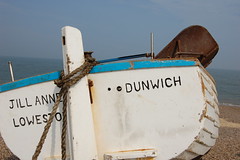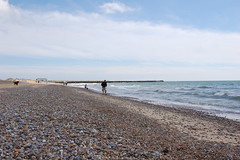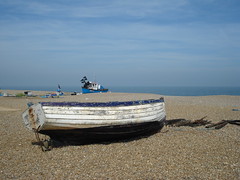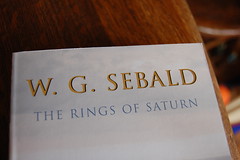There have been a number of posts popping up around the use of the social web within government, both as a reaction to discussions of the civil service guidelines for online participation and to the need to provide the tools and skills to public servants to make their interventions effective.
Firstly, the guidelines, about which I have written bits here and here. Dominic Campbell wishes they weren’t necessary:
Unfortunately, the moment that pen is put to paper and guidance is created, no matter how effective and light weight, things change and often for the worse. Guidance removes the freedom for people to think for themselves and results in situations where people download confidential files onto disc and send them through the post. Until civil servants are trusted to think for themselves, mistakes will continue to happen and the latent creative potential of the collective civil service will remain untapped, no matter how much guidance is created to give permission to behave to the contrary.
Dominic and I had a brief debate on the Local Government Community of Practice for Social Media about this. Whilst I accept his point that guidance should be unnecessary, they do have a certain empowering capacity which I think is very much a good thing at the moment. It provides legitimacy to those that want to engage in this space which wasn’t there before.
Jeremy Gould wrote an outline of the discussions he had at a recent gathering at the Cabinet Office:
I think I heardpeople were asking how to translate the principles into more operational / organisational guidance. In other words, how they’d actually do this stuff. But its also clear that we are still in the very early days of experimenting with the technologies and tools. There is no correct way to do things or optimum tool or technology. This is not the time for mandated solutions but for encouraging innovation.
This leads us nicely into a group of posts by Emma Mulqueeny, who is looking to develop a toolkit to guide civil servants around the social web and how they can be involved in it. This could be seen as being the bit that picks up on the operational side of things that Jeremy mentions people are actually looking for and will be much welcomed, I’m sure. Emma’s blog posts, by the way, are a great example of chucking an idea up in the air and letting people gives their views on it – the comments on her initial post have some great insights.
What’s good about this debate is that we seem to know be moving on from “We can’t introduce the tools til we change the culture” to “We can’t change the culture, let’s play with the tools anyway”. The guerilla, stealth style introduction of social web activity, best summed up in Colin McKay’s ebook, is surely the way forward: get it working, get it embedded, report on the benefits.
The trouble with putting together any generalist toolkit is that the whole issue is so damn complicated. As I have mentioned before, there are at least 16 different ways for officials to engage with the social web, depending on whether:
- They do so internally or externally
- They use social media to communicate or collaborate
- They use their own platform, or get involved with someone else’s
- They do so officially, or personally
Any toolkit or operational guidance will need to focus on providing a way for public servants to work their way through these options so they can decide on their best approach. They can be wildly different, of course: writing a blog is completely different as an activity to being active on a social network, say. Something is also required on the worldview required to make this stuff a success (give up on a certain amount of control, be prepared to accept some messiness); the roles also need defining (who does what when, etc) and then the platforms require explanation.
There needs to be material on how to make online activity effective, cutting through a lot of the bullshit (sorry, mum) that surrounds sites like NetMums or Wikipedia that are trotted out when anyone wants an example of an online community. Stuff to focus on includes:
- That you need a core group of people involved in any project. You won’t get everyone in the UK interested enough in your consultation to take part in it. A tiny proportion of Wikipedia users edit articles to any major extent. The proportion of Linux users who actually contribute is miniscule. This isn’t a bad thing, but nor is it collaboration on a truly mass scale. Don’t overestimate how interested people are likely to be.
- Any collaborative online exercise requires some kind of governance arrangements, no matter how informal. This isn’t about anarchy but is about giving people the platform to get involved, which still requires someone to have a leadership role.
- The tools that are used must be intuitive and accessible. They must fit the type of work being undertaken. WordPress and MediaWiki are jolly popular at the moment, not least because they are quick and free. But do they suit every exercise?
- Aggregating, moderating and reporting on outputs is vital, and again is a role that ought to be led from the centre. Outputs ought to be managed to ensure that the project actually delivers.
We don’t want to get to bogged down in what a blog is, and how to install WordPress, however. Instead case studies of how this stuff is working already would be useful to help persuade superiors that this is a Good Thing to be doing. Luckily, quite a few potential examples are starting to spring up:
- Number 10’s ePetitions site
- Foreign and Commonwealth Office’s blogs
- DIUS’s consultation exercises
- CLG’s Communities in Control blog
- Various government (central and local) forays into Twitter
There is plenty of material to go into a toolkit, before you even start talking about the tools, then. There is a bit of consensus forming, I feel, on the approach that can be taken to any kind of online participation by officials:
- start listening,
- then acknowledge what people are saying,
- then respond to them,
- then start creating new content for them.
It is important to be comfortable with each stage before moving on.
Having been reading and typing away for a good hour now, it’s just occurred to me that I haven’t mentioned just why government should want to be engaged in the social web at all. Perhaps a lot of us enthusiasts don’t ask ourselves that question enough. It should be the first question asked in any toolkit: why are you doing this? I think there are a number of reasons:
- To produce better policy by taking a collaborative approach to it
- To better put across the government’s position on issues under discussion
- To explain and educate about what government is doing and why
- To remove some of the barriers between the governed and the government, as well as those that operate the machinery of government
I suspect there are many other arguments, and also that there are people better at putting them than me.
I’ll finish by quoting a recent piece by David Wilcox, setting a challenge to government:
This is where the challenge is greatest for Government. What’s traditionally worked for Whitehall is top-down, controlled, and not very joined-up You get people to come to your fund, your support programme, your events … then expect them to do the rounds with other departments and organisations. What works on the web is to go where the people are. Instead of building yet another web site it is often better to do a lightweight blog and then concentrate on using a range of tools and platforms to connect with existing communities and networks. The response of the social technology innovator, faced with a new piece of work or project developed by someone else, is “great, if you’ve done that already, I can build on it”. Open source thinking.









